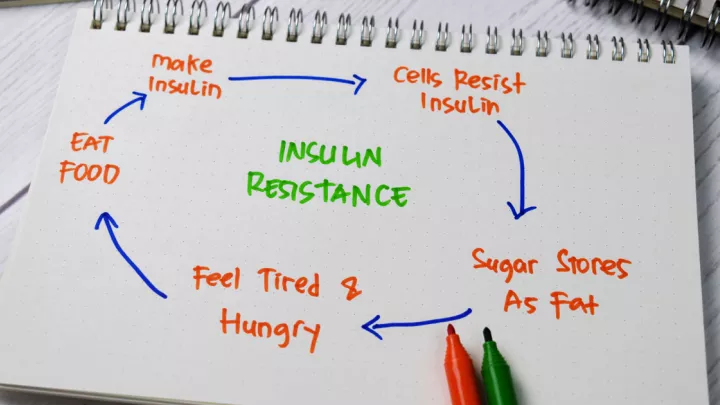The difference between insulin resistance and prediabetes

Prediabetes and insulin resistance – you may have heard the terms used together. But what are they and do they mean the same thing?
"The two are very closely related," says Sydney Blount, MD, Nebraska Medicine endocrinologist. "Insulin resistance can lead to prediabetes and most people with prediabetes have insulin resistance."
The difference between prediabetes and insulin resistance
Prediabetes means your blood sugar levels are higher than normal. But they have not reached levels high enough to be diagnosed with diabetes. Prediabetes is caused by insulin resistance.
Prediabetes and diabetes occur when the pancreas doesn't make enough insulin to maintain normal blood glucose levels.
Insulin resistance occurs when cells in your body do not respond well to insulin. Insulin is the key that allows glucose to move from the blood into cells where it is used for energy. With insulin resistance, it takes more insulin to complete this process. To make up for insulin resistance, the pancreas secretes more insulin. This helps maintain normal blood glucose levels.
"You can have insulin resistance before you are diagnosed with prediabetes," says Dr. Blount. "That's because, initially, your body will try to make up for insulin resistance. It does this by making more insulin to maintain normal blood glucose levels. Over time, however, your pancreas may no longer be able to produce enough insulin to overcome insulin resistance. This can lead to higher-than-normal blood glucose levels. When this happens, you have prediabetes."
How do you know if you have prediabetes
Unfortunately, prediabetes has no symptoms. As a result, most people will not know they have it unless they are screened. Screening can entail:
- Fasting blood sugar test
- Oral glucose tolerance test
- Hemoglobin A1c test
Screening and frequency depend on your risk factors.
Screening guidelines for prediabetes/diabetes
- Everyone should be screened by age 35
- Repeat screening every three years if results are normal. Screen more frequently if risk factors exist
- If you have risk factors, get screened before age 35 per your doctor's recommendation
How to know if you have insulin resistance
"There is no one blood test to diagnose insulin resistance," says Dr. Blount. "Clinicians look at a number of factors." These include:
- Blood glucose levels
- Cholesterol levels
- Physical exam
Signs of insulin resistance include:
- Darkening of the skin around the armpits
- Darkening of the skin around the side and back of the neck
"People with insulin resistance should be screened for prediabetes," recommends Dr. Blount.
"There is no exact time frame for how long someone with insulin resistance will develop prediabetes. This is because there are so many individual factors that affect people."
Insulin resistance left unmanaged can also lead to diabetes as well other metabolic complications. These include:
- Nonalcoholic fatty liver disease
- Elevated cholesterol and triglyceride levels
- High blood pressure
- Heart disease
Risk factors for prediabetes and insulin resistance
Certain risk factors increase your risk for insulin resistance and prediabetes. These should be discussed with your doctor so you can be screened and monitored properly. These include:
- Family history with a first-degree relative having diabetes
- History of gestational diabetes
- Overweight or obesity
- Eating a diet high in processed foods
- Sedentary lifestyle
- Ethnic minorities
- Polycystic ovary syndrome (PCOS)
- Obstructive sleep apnea
How to prevent and treat prediabetes and insulin resistance
You can prevent and even reverse insulin resistance as well as prediabetes by adopting healthy lifestyle habits. The key is to start these changes early on. Once you have diabetes, it can be very difficult to reverse, notes Dr. Blount.
Diabetes medications are not prescribed until you have been diagnosed with diabetes. There are many classes of medications that work differently to achieve normal glucose levels. Some of these function by increasing your body's sensitivity to insulin.
Prediabetes and insulin prevention lifestyle changes
- Regular exercise. Work toward exercising 150 minutes per week or just 30 minutes five days a week. Include a combination of light aerobics and strength training
- Lose weight. As little as a 7% reduction in weight can lower your risk dramatically
- Eat healthily. Reduce processed foods and foods high in sugar and carbohydrates. Use the Diabetes Plate Method. This entails filling half your plate with nonstarchy vegetables, one-quarter with lean proteins, and one-quarter with carbohydrates such as whole grains, beans and legumes, fruits and dried fruit, and dairy products like milk and yogurt
- Get adequate sleep
- Quit smoking
- Manage sleep apnea. If you suspect you have sleep apnea, get evaluated by your doctor and get treated
"Most people will see improvements within a few months if they stay committed to adopting healthier habits," Dr. Blount says. "In fact, the Diabetes Prevention Program study showed that people who lost 7% of their body weight and exercised 150 minutes a week, reduced their diabetes risk by 58% over three years."
Diabetes symptoms
If your condition progresses to diabetes, you may experience the following symptoms. You should see your doctor right away if you have these symptoms:
- Excessive thirst
- Excessive urination
- Excessive hunger
- Fatigue
- Blurring vision
- Numbness in the feet
Complications of diabetes
Uncontrolled diabetes can lead to a host of other disorders. These include:
- Heart disease
- Stroke
- Eye problems
- Kidney disease
- Nerve problems
- Amputations
"Remember, prediabetes and Type 2 diabetes are preventable," says Dr. Blount. "If you have insulin resistance or prediabetes, start making changes to your diet and exercise routine. Even small changes can have a large impact in delaying or preventing the progression to diabetes."
Call 800.922.0000 to schedule an appointment with one of our primary care doctors to be evaluated.





